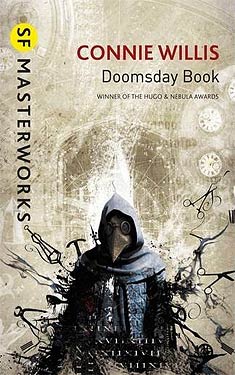Connie Willis
Completed 5/17/2013, reviewed 5/18/2013
5 stars
The first Connie Willis book I read was “To Say Nothing Of
The Dog.” I found it boring. Knowing that I had two more Willis books to
read filled me with dread. Reluctantly,
I finally got this book from the library.
I tried to psych myself up for it.
I had just completed “Neuromancer” and didn’t like it. Any book after this would be better. And “Doomsday” was about time travel to the
middle ages.
It wasn’t just a step up; it was fantastic. I read this novel voraciously. It was the first novel I’ve read while
commuting on a bus or light rail, 7-10 pages per ride, where I didn’t feel like
I lost the momentum of the story. I read
it every chance I got. It was that
good. This novel made me fall in love
with Connie Willis’ writing.
The basic story of travelling to the 14th century
tugged at my fascination of that period.
About 20 years ago, I listened to Barbara Tuchman’s “A Distant Mirror.”
Although I wasn’t as good a reader of non-fiction at that time, I mostly
enjoyed it. I love watching Science
Channel documentaries about the middle ages.
The gift of Connie Willis is that she made me care for people of the
1300s more than any non-fiction work I’ve come across.
Like “Dog,” “Doomsday” bounces back and forth between the
past and the present. The great thing
about this book is that the two times parallel each other. She makes you an intimate part of the action
of both times. And she creates vivid
characters in each as well.
There were times when I thought she could have moved that
action a little more quickly. But she
creates many supporting characters who are just as equally well-developed. Their characters take time to unfold, but
they become intricately involved in the movement of the story.
And I cared so much for so many of the characters, Kirvin,
Agnes, Dunworthy, Dr Mary Ahern, even the annoying Mrs Gaddins and Lady
Imyene. And what’s a story that takes
place in England
without annoying English stereotypes. At
times, their actions are absurd, funny, and frustrating, as in a Monty Python
sketch. But they are more than comic
relief, they create interpersonal conflict and make the story that much more
exciting and readable.
Kirvin is a brilliant character. Her relationship with the “contemps” of the 1300s
is wonderful, joyful, and heartbreaking.
I was nearly moved to tears towards the end of the book by her love for
these people. It wasn’t saccharine; it
was mature drama. Her evolution from outsider
to angel is completely gripping.
I have to sing the praises
of this book. I think I’m going to give
this book 5 stars because of how much it moved me. The ending is gut-wrenching and
breath-taking. I would consider this
book a modern masterpiece of science fiction.
It is the perfect example of the evolution of soft SF. It’s a well crafted story that keeps you
riveted to the end, with amazing characters with whom you develop your own
deep, personal relationship.

No comments:
Post a Comment